Discover the intriguing impact of your choice of outdoor plants on your home's energy balance according to ancient feng shui wisdom.
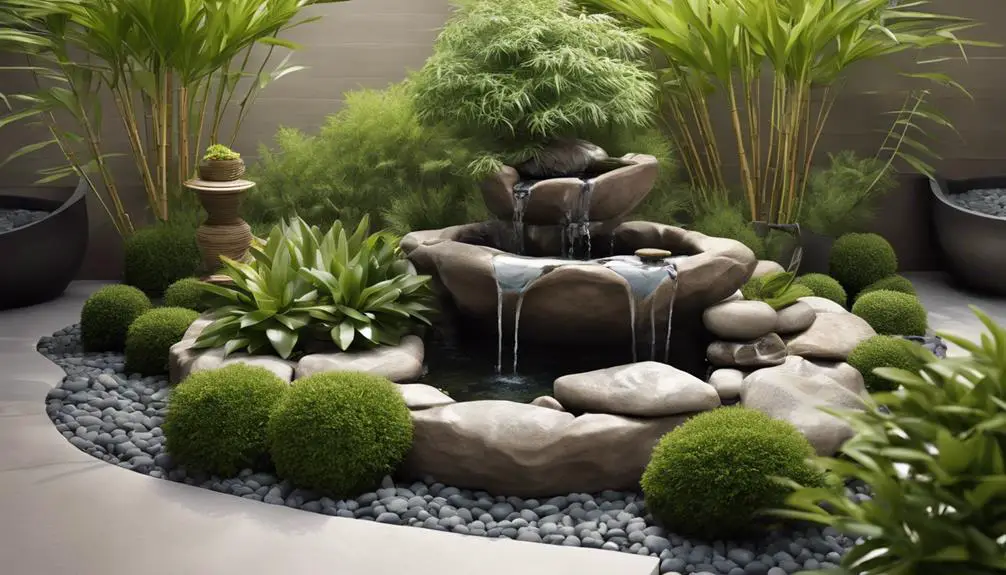
Feng Shui Outdoor Plants
Drawing from the ancient wisdom of feng shui, you might recall how it emphasizes the harmony between individuals and their environment. But have you ever considered how your choice of outdoor plants could impact this balance?
It's intriguing to think that your garden selections aren't just a reflection of your taste, but can potentially influence the energies around your home. There's a lot to explore in feng shui's approach to outdoor plants, and you might be surprised by what you'll discover.
Don't you wonder how your garden measures up?
Key Takeaways
- Feng Shui principles guide the selection and placement of outdoor plants to harmonize spaces and attract positive energy.
- Understanding plant symbolism and color significance in Feng Shui is essential for enhancing energy flow.
- Proper care and maintenance of Feng Shui plants ensure their vitality and continued positive energy contribution.
- The benefits of Feng Shui outdoor plants include improved air quality, stress reduction, and an overall boost in mental and physical health.
Understanding Feng Shui Principles
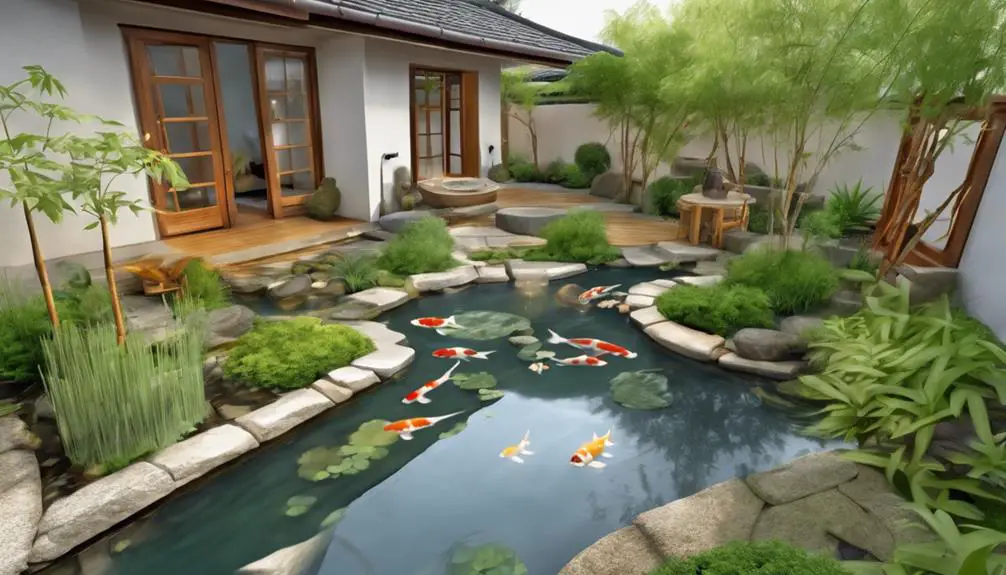
Diving into the world of Feng Shui, you'll find it's not just about arranging your indoor space, but it also extends to how you harmonize your outdoor space with nature's elements. This ancient Chinese system brims with rich Feng Shui history, offering a unique lens to perceive the world. It's a dance between yin and yang, a harmonious interaction of elements to create balance and attract positive energy.
You'll come to appreciate the way it simplifies the complex interactions of elements – wood, fire, earth, metal, and water. Each element feeds, controls, or destroys another in a cycle. Wood feeds fire; fire creates earth; earth bears metal; metal collects water; and water nourishes wood. Conversely, wood parts earth; earth dams water; water extinguishes fire; fire melts metal; and metal chops wood. This intricate dance of interaction is the heart of Feng Shui.
Understanding these principles isn't just about aesthetic appeal. It's about creating an environment that aligns with your life's goals and aspirations. By mastering these principles, you're not just decorating a space. You're crafting an environment that fosters positivity, growth, and harmony.
The Importance of Outdoor Plants

In your journey to master Feng Shui, you'll soon discover that outdoor plants play a pivotal role in aligning your garden with the delicate balance of nature's elements, thereby attracting vital energy to your living space. Each plant holds a wealth of symbolism, their leaves whispering ancient tales of harmony and prosperity, their roots digging deep into the earth's wisdom. Their vibrant hues and diverse forms act as living brush strokes, painting your garden with a canvas of tranquility and serenity.
Plant symbolism isn't merely an aesthetic consideration. Each species, flower, and leaf carries a unique resonance that reverberates with the universe's cosmic rhythm, influencing the energy flow around your home. Understanding these intricate nuances can help you create a garden that's not just visually pleasing, but also energetically nourishing.
Beyond their mystical qualities, outdoor plants provide significant eco benefits. They act as natural air purifiers, their photosynthesis process absorbing carbon dioxide and releasing oxygen, fostering a healthier environment for you and your family. They also support local biodiversity, offering shelter and nourishment to various insects and birds, thus promoting a vibrant and balanced ecosystem right in your backyard. Embrace the power of outdoor plants, and let your garden become a living testament to the harmony of Feng Shui.
Choosing Your Feng Shui Plants
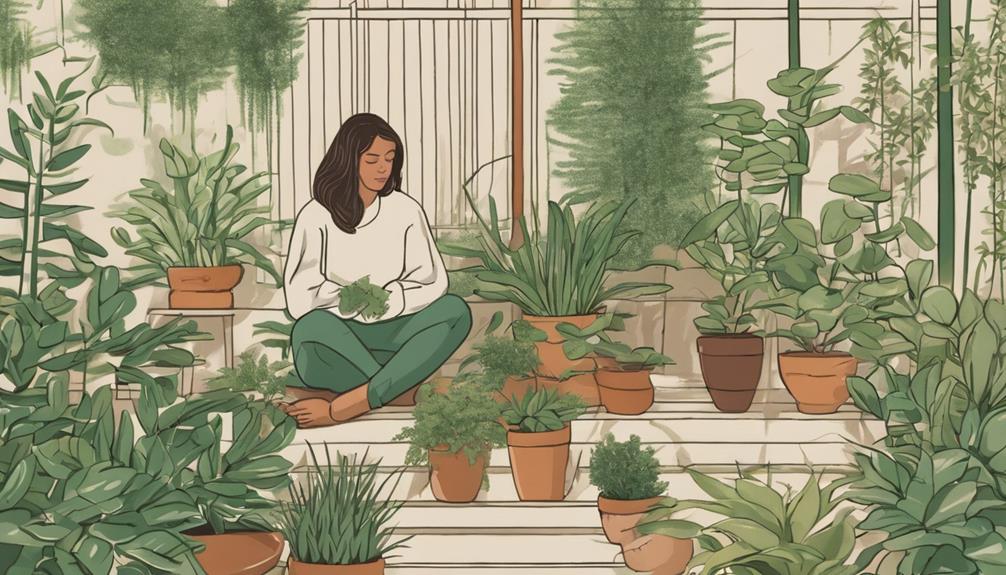
Navigating the vast world of Feng Shui plants may seem daunting, but with a little knowledge and guidance, you'll be able to select the perfect flora to harmonize your outdoor space. Start by understanding the inherent plant symbolism, an essential aspect of Feng Shui. Each plant has its own unique energy and contributes differently to the balance of your space. For example, the resilient bamboo symbolizes a robust life and prosperity, while the delicate orchid embodies love and beauty.
Equally essential is the color significance. Feng Shui color theory corresponds to the five elements—wood, fire, earth, metal, and water. Green plants, for instance, represent growth and vitality, fostering an environment of healing and renewal. On the other hand, red flowers can ignite passion and excitement, making them the perfect choice for invigorating spaces.
Choosing your Feng Shui plants is an artistic process, a dance between intuition and knowledge. By comprehending plant symbolism and color significance, you'll be able to create a vibrant, harmonious garden that not only delights the senses but also nurtures the soul.
Placement of Feng Shui Plants
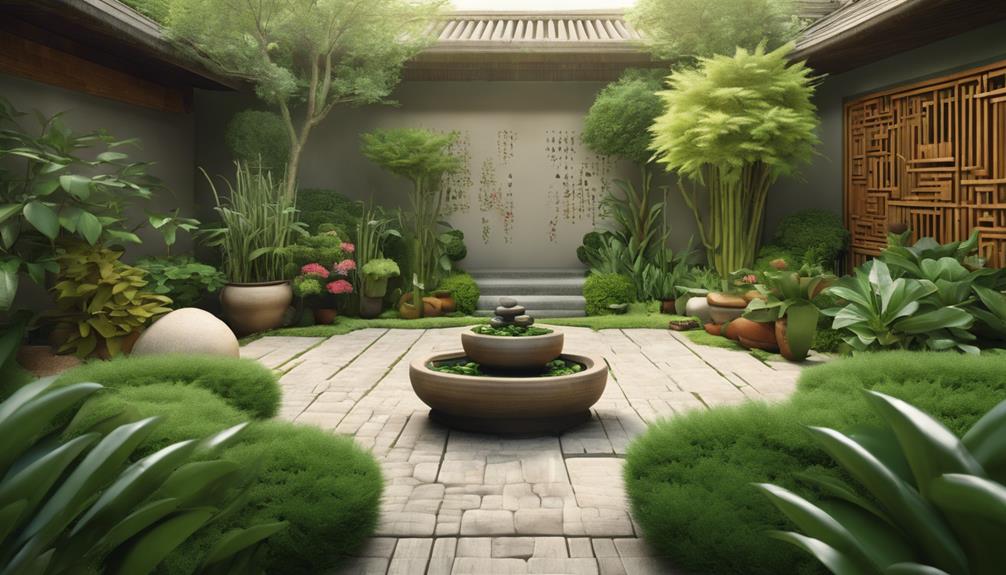
Once you've chosen your Feng Shui plants, it's crucial to place them thoughtfully in your garden to maximize their energy-enhancing properties. The placement of these plants isn't haphazard, but rather, it's a deliberate act steeped in the rich knowledge of Feng Shui. It's about understanding plant symbolism and color significance and using them to influence the flow of energy, or 'Qi', around your outdoor space.
Plant symbolism in Feng Shui is vast and beautiful. Consider the bamboo plant, for instance. It's seen as a symbol of resilience and flexibility, so placing it in a windy spot in your garden could help enhance these qualities in your life. Similarly, placing flowering plants in the east can improve health and family relationships due to their association with the Wood Element.
Color significance also plays an important role in Feng Shui. Red flowers, for instance, bring fame and recognition when placed in the south, while white flowers are best placed in the west to foster creativity and children's luck. Remember, it's not just about placing plants randomly; it's about creating a harmonious energy flow that resonates with your personal aspirations and the natural world.
Caring for Your Feng Shui Plants
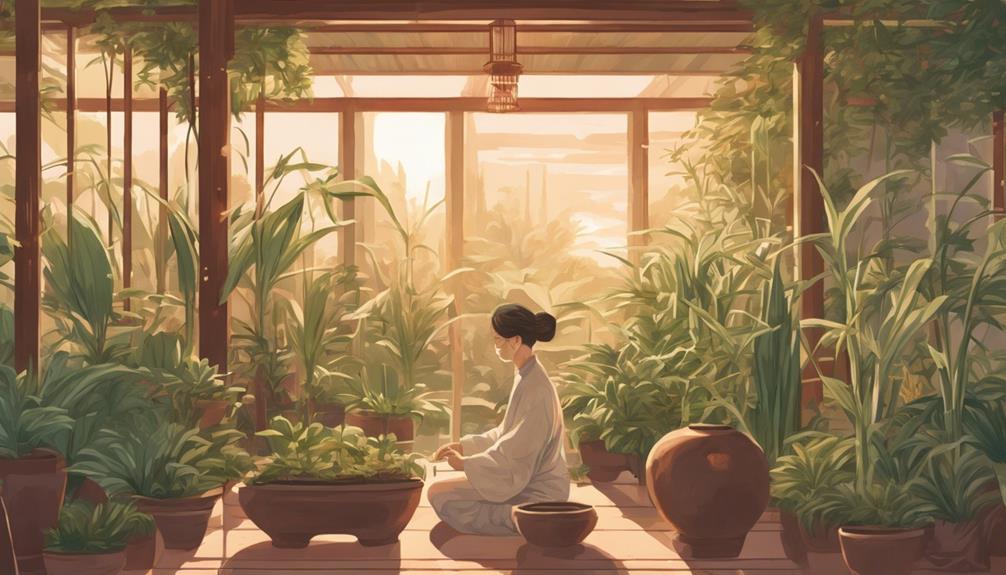
Proper care for your Feng Shui plants not only ensures their healthy growth but also amplifies the positive energy they contribute to your outdoor space. It's crucial to provide adequate plant nourishment and attend to seasonal adaptations.
Understanding these pivotal elements ensures your plants thrive in different weather conditions and stay vibrant throughout the year.
Here's a handy table that outlines essential care tips for your Feng Shui plants:
| Spring | Summer | Autumn/Winter | |
|---|---|---|---|
| Watering | Regular, as the plant awakens from dormancy | Increased, due to higher evaporation rates | Reduced, to prevent root rot in cooler temperatures |
| Sunlight | Gradual exposure, to acclimate the plant to increasing light | Shade during peak hours, to avoid scorching | Limited exposure, as most plants enter dormancy |
| Fertilization (Plant nourishment) | Begin a regular feeding schedule | Continue regular feeding | Reduce or stop, as growth slows or stops |
Timely care creates a harmonious balance, giving your plants the strength to survive seasonal changes. It's worth investing time and effort in maintaining your Feng Shui plants. After all, their vitality directly impacts the positive energy flow in your garden.
Feng Shui Plants: Common Myths Debunked

While you're meticulously caring for your Feng Shui plants, you might come across a few widespread myths that can muddy the waters of your understanding. So, let's dive into some myth busting to clear up any confusion.
Firstly, it's a common misconception that all Feng Shui plants bring the same energy. The truth is, each plant carries its own symbolic meanings. For instance, the Jade Plant symbolizes wealth and prosperity, while the Peace Lily embodies tranquility and harmony.
Next, there's the myth that Feng Shui plants don't require sunlight. It's an oversimplification. In reality, different plants have varying sunlight needs based on their individual nature.
Another myth suggests that placing plants in the bedroom brings bad luck. Don't let this deter you! It's all about balance. While too many plants might disturb your rest, a single, well-chosen plant can promote a serene atmosphere.
Lastly, some believe that any dying plant should be immediately discarded to prevent negative energy. However, nurturing a struggling plant back to health can actually be a potent symbol of resilience and growth.
Frequently Asked Questions
What Are Some Common Mistakes People Make When Implementing Feng Shui With Outdoor Plants?
You might stumble upon common errors like Plant Placement Errors or Incorrect Plant Selection when applying feng shui to your garden.
You're not alone if you've placed a plant that's too big near your home's entrance or picked a plant that doesn't suit your garden's energy.
It's important to remember that every plant has a unique energy and placing them correctly can make a huge difference to your garden's overall feng shui.
How Does the Season or the Climate Affect the Feng Shui of Outdoor Plants?
Seasons and climate significantly influence your outdoor Feng Shui. Climate adaptation in Feng Shui is essential. You need to select plants that can survive and thrive in your area's specific climate conditions.
Seasonal transitions also impact Feng Shui. As seasons change, so should your plant arrangement. It's not just about placing plants, it's about nurturing a harmonious energy flow throughout the year.
Are There Specific Feng Shui Rules for Outdoor Plants in Commercial Spaces?
Yes, there are specific Feng Shui rules for outdoor plants in commercial spaces.
You'll need to adopt plant placement strategies that harmonize with the environment.
It's not just about placing plants randomly, but rather about energizing your commercial space.
The right plant, in the right place, can attract positive energy and prosperity.
Does the Size or Type of the Outdoor Space Impact the Choice of Feng Shui Plants?
Yes, the size and type of your outdoor space greatly impact your choice of feng shui plants. Large spaces can accommodate bigger plants while smaller ones require petite plants. Plant positioning also matters; place them wisely to create balance.
Choose plants based on color symbolism in feng shui, like red for luck or green for growth. Understanding your space's characteristics allows you to create a harmonious and energy-boosting environment.
Can Feng Shui Principles Be Applied to Vegetable and Herb Gardens?
Absolutely, you can apply Feng Shui principles to your vegetable and herb gardens.
Plant positioning plays a crucial role. You'll want to balance yin and yang energies, considering sunlight, shade, and wind directions.
Color significance is also essential. Different colors stimulate different energies. For example, green fosters growth and healing. So, you might want to plant more green leafy veggies.
It's all about creating harmony and positive energy flow in your garden.
Conclusion
So, you've navigated the world of Feng Shui outdoor plants, understanding their role, picking the right ones, figuring out their ideal placement, and learning to care for them.
Don't let misconceptions sway you. Embrace this journey, let your garden become a source of positive energy and balance.
Remember, Feng Shui isn't just about aesthetics; it's a way of life. Your outdoor space is now not just beautiful but also harmonious, inviting, and enriched with life energy.



Sign up